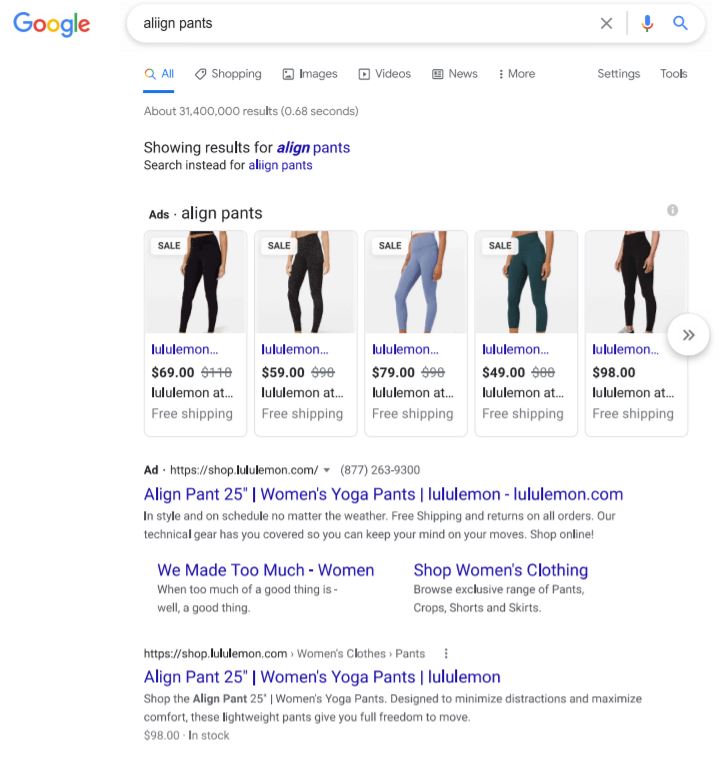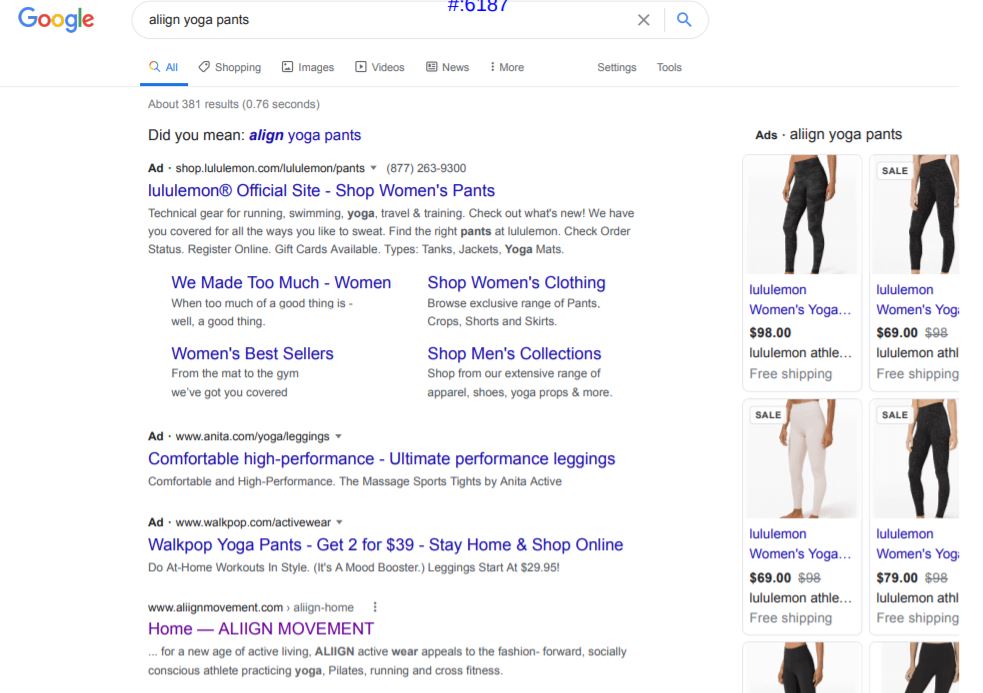Google’s Search Disambiguation Doesn’t Create Initial Interest Confusion–Aliign v. lululemon
Aliign “is an event, lifestyle, and apparel company” allegedly with a first trademark use in 2011. Since 2014, they have sold a total of 7 units of apparel (5 of which were bought by the CEO’s friends). lululemon is the well-known yoga gear company. In 2008, it launched its successful “Align” yoga mat line. In 2015, it extended the “Align” mark to yoga apparel, which has generated $1B in sales. Aliign sued lululemon for trademark infringement. lululemon sought summary judgment.
I’ll concentrate on the initial interest confusion claim. The court says: “to survive summary judgment on an initial interest confusion claim, AAW must raise a question of material fact as to whether consumers searching for AAW’s product are confused and lured to lululemon’s products.” This sounds a lot like bait-and-switch, but the court still calls it initial interest confusion.
Aliign premised its IIC claim on Google search results for the phrase “aliign pants” and “aliign yoga pants.” In both cases, Google automatically substitutes “align” for “aliign” and shows the substituted results, while asking searchers if they want to “search instead” for “aliign.” Unsurprisingly, lululemon dominates the substituted search results.
If the searchers do choose the option to search “aliign,” the Aliign website is the first organic result but a lululemon ad appears above it.
The court treats this as a straightforward application of the MTM v. Amazon ruling. It analyzes two factors:
- Purchaser sophistication. Both Aliign and lululemon sell premium yoga pants that cost 4x the pants you can buy at Target or Nordstroms, so the shoppers obviously are looking for something special.
- Labeled search results. Google’s interface makes clear that it swapped the term and gives searchers an easy way to swap back. lululemon’s brand also displays prominently in its keyword ads. This clear labeling means it’s OK that lululemon also appears as the top ad on the “aliign” search results page.
Thus, “no reasonable juror could find that there is a likelihood that a reasonably prudent customer accustomed to online shopping will be confused by the Google search results.”
Implications
As usual, the “initial interest confusion” doctrine added nothing to the opinion. The court would still have to examine the ad contents, and the site it linked to, to evaluate consumer confusion. Then again, there’s almost no circumstance where “initial interest confusion” enhances a court’s analysis.
The court is essentially saying that Google’s prompt (“did you mean” X instead of Y?) helps consumers disambiguate Aliign and Align to realize they may be different. Thus, Google’s prompt dispels consumer confusion, not exacerbates it. For more on this, see my expert report in the Larsen v. Larson case.
Aliign spent a lot of money on this lawsuit, seemingly far disproportionate to the amount of money they expect to make from sales of their own goods (they made only 2 independent sales since 2014). If they really wanted to build their business, they could have invested that money into marketing instead of legal fees. The fact they chose to spend their money on their lawyers colors this lawsuit with a trollish hue.
Consistent with that, Aliign is spending more marketing dollars to appeal this lawsuit to the Ninth Circuit. As an outsider to this case, the First Rule of Holes comes to mind.
Case citation: Aliign Activation Wear, LLC v. lululemon athletica Canada Inc., 2021 WL 3117239 (C.D. Cal. June 7, 2021). The plaintiff is represented by Browne George Ross, the same law firm that brought the unsuccessful Prager U v. YouTube, Divino v. Google, and Newman v. Google cases.
More Posts About Keyword Advertising
* Ohio Bans Competitive Keyword Advertising by Lawyers
* Want to Engage in Anti-Competitive Trademark Bullying? Second Circuit Says: Great, Have a Nice Day!–1-800 Contacts v. FTC
* Selling Keyword Ads Isn’t Theft or Conversion–Edible IP v. Google
* Competitive Keyword Advertising Still Isn’t Trademark Infringement, Unless…. –Adler v. Reyes & Adler v. McNeil
* Three Keyword Advertising Decisions in a Week, and the Trademark Owners Lost Them All
* Competitor Gets Pyrrhic Victory in False Advertising Suit Over Search Ads–Harbor Breeze v. Newport Fishing
* IP/Internet/Antitrust Professor Amicus Brief in 1-800 Contacts v. FTC
* New Jersey Attorney Ethics Opinion Blesses Competitive Keyword Advertising (…or Does It?)
* Another Competitive Keyword Advertising Lawsuit Fails–Dr. Greenberg v. Perfect Body Image
* The Florida Bar Regulates, But Doesn’t Ban, Competitive Keyword Ads
* Rounding Up Three Recent Keyword Advertising Cases–Comphy v. Amazon & More
* Do Adjacent Organic Search Results Constitute Trademark Infringement? Of Course Not…But…–America CAN! v. CDF
* The Ongoing Saga of the Florida Bar’s Angst About Competitive Keyword Advertising
* Your Periodic Reminder That Keyword Ad Lawsuits Are Stupid–Passport Health v. Avance
* Restricting Competitive Keyword Ads Is Anti-Competitive–FTC v. 1-800 Contacts
* Another Failed Trademark Suit Over Competitive Keyword Advertising–JIVE v. Wine Racks America
* Negative Keywords Help Defeat Preliminary Injunction–DealDash v. ContextLogic
* The Florida Bar and Competitive Keyword Advertising: A Tragicomedy (in 3 Parts)
* Another Court Says Competitive Keyword Advertising Doesn’t Cause Confusion
* Competitive Keyword Advertising Doesn’t Show Bad Intent–ONEpul v. BagSpot
* Brief Roundup of Three Keyword Advertising Lawsuit Developments
* Interesting Tidbits From FTC’s Antitrust Win Against 1-800 Contacts’ Keyword Ad Restrictions
* 1-800 Contacts Charges Higher Prices Than Its Online Competitors, But They Are OK With That–FTC v. 1-800 Contacts
* FTC Explains Why It Thinks 1-800 Contacts’ Keyword Ad Settlements Were Anti-Competitive–FTC v. 1-800 Contacts
* Amazon Defeats Lawsuit Over Its Keyword Ad Purchases–Lasoff v. Amazon
* More Evidence Why Keyword Advertising Litigation Is Waning
* Court Dumps Crappy Trademark & Keyword Ad Case–ONEPul v. BagSpot
* AdWords Buys Using Geographic Terms Support Personal Jurisdiction–Rilley v. MoneyMutual
* FTC Sues 1-800 Contacts For Restricting Competitive Keyword Advertising
* Competitive Keyword Advertising Lawsuit Will Go To A Jury–Edible Arrangements v. Provide Commerce
* Texas Ethics Opinion Approves Competitive Keyword Ads By Lawyers
* Court Beats Down Another Competitive Keyword Advertising Lawsuit–Beast Sports v. BPI
* Another Murky Opinion on Lawyers Buying Keyword Ads on Other Lawyers’ Names–In re Naert
* Keyword Ad Lawsuit Isn’t Covered By California’s Anti-SLAPP Law
* Confusion From Competitive Keyword Advertising? Fuhgeddaboudit
* Competitive Keyword Advertising Permitted As Nominative Use–ElitePay Global v. CardPaymentOptions
* Google And Yahoo Defeat Last Remaining Lawsuit Over Competitive Keyword Advertising
* Mixed Ruling in Competitive Keyword Advertising Case–Goldline v. Regal
* Another Competitive Keyword Advertising Lawsuit Fails–Infogroup v. DatabaseLLC
* Damages from Competitive Keyword Advertising Are “Vanishingly Small”
* More Defendants Win Keyword Advertising Lawsuits
* Another Keyword Advertising Lawsuit Fails Badly
* Duplicitous Competitive Keyword Advertising Lawsuits–Fareportal v. LBF (& Vice-Versa)
* Trademark Owners Just Can’t Win Keyword Advertising Cases–EarthCam v. OxBlue
* Want To Know Amazon’s Confidential Settlement Terms For A Keyword Advertising Lawsuit? Merry Christmas!
* Florida Allows Competitive Keyword Advertising By Lawyers
* Another Keyword Advertising Lawsuit Unceremoniously Dismissed–Infostream v. Avid
* Another Keyword Advertising Lawsuit Fails–Allied Interstate v. Kimmel & Silverman
* More Evidence That Competitive Keyword Advertising Benefits Trademark Owners
* Suing Over Keyword Advertising Is A Bad Business Decision For Trademark Owners
* Florida Proposes to Ban Competitive Keyword Advertising by Lawyers
* More Confirmation That Google Has Won the AdWords Trademark Battles Worldwide
* Google’s Search Suggestions Don’t Violate Wisconsin Publicity Rights Law
* Amazon’s Merchandising of Its Search Results Doesn’t Violate Trademark Law
* Buying Keyword Ads on People’s Names Doesn’t Violate Their Publicity Rights
* With Its Australian Court Victory, Google Moves Closer to Legitimizing Keyword Advertising Globally
* Yet Another Ruling That Competitive Keyword Ad Lawsuits Are Stupid–Louisiana Pacific v. James Hardie
* Another Google AdWords Advertiser Defeats Trademark Infringement Lawsuit
* With Rosetta Stone Settlement, Google Gets Closer to Legitimizing Billions of AdWords Revenue
* Google Defeats Trademark Challenge to Its AdWords Service
* Newly Released Consumer Survey Indicates that Legal Concerns About Competitive Keyword Advertising Are Overblown


